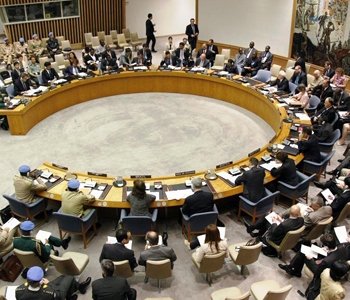Majority of Security Council members oppose sanctions on Sudan
By ED JOHNSON, Associated Press Writer
LONDON, Aug 20, 2004 (AP) — A majority of United Nations Security Council members opposes immediate heavy sanctions on Sudan if it fails to quell ethnic violence in the Darfur region by the end of the month, Britain’s Foreign Office said Friday.
 On July 30, the Security Council gave the government in Khartoum 30 days to disarm Arab militias blamed for killing thousands of black African farmers, or face economic or diplomatic punishment.
On July 30, the Security Council gave the government in Khartoum 30 days to disarm Arab militias blamed for killing thousands of black African farmers, or face economic or diplomatic punishment.
More than a million people have been forced to flee their homes in the western region in what the UN has called the world’s worst humanitarian crisis.
Briefing reporters Friday ahead of British Foreign Secretary Jack Straw’s visit to Sudan, officials said council members were still debating what action to take if the deadline is missed.
“The natural centre of gravity in the council is not the immediate imposition of heavy duty sanctions on Sudan,” said a senior Foreign Office official, who requested anonymity.
Some countries were opposed in principle to sanctions, others feared that vested interests in Sudan would be damaged by economic Embargoes, and others, including Britain, were wary of giving the impression that the “international community is beating up on the government of Sudan,” the official added.
The Security Council will consider how much progress the Sudanese government has made in providing proper access to humanitarian groups, tackling human rights abuses, providing security to people in Darfur and negotiating with rebel groups. Members would want to see “measurable, genuine compliance” by Khartoum, the official said.
The Darfur conflict began 18 months ago, when black African rebel groups rose up against Sudan’s Arab-dominated government, claiming discrimination in the distribution of the large, arid region’s scarce resources.
Since then, Arab militias called the Janjaweed and purportedly backed by the government have gone on a rampage, destroying villages, killing and raping across the western Sudanese region.
Some 180,000 refugees already have crossed into neighbouring Chad, where they are scattered along the border or have been moved to camps away from the volatile frontier. The United Nations on Friday warned that tens of thousands more refugees could flee Darfur, putting further pressure on strained resources in Chad.
International rights groups say Khartoum has backed the Janjaweed in an ethnic cleansing campaign against the African villagers. The government has strongly denied the accusations, saying the fighting was a result of tribal conflicts over land and water resources.
African Union-sponsored peace talks are scheduled for Monday in Nigeria, bringing together Sudanese government officials and high-level delegations from the two rebel groups fighting government forces.
The African Union has sent 80 observers to monitor a rarely adhered to April 8 ceasefire. Rwanda already has 150 troops on the ground in Darfur to protect the observers and Nigeria is expected to send 150 troops to Darfur later this week to bolster the AU force.
Like other western nations, Britain is keen for the African Union to lead -to find African solutions for African problems. It is providing financial and logistical support behind the scenes, but has refused to rule out military intervention of its own.
